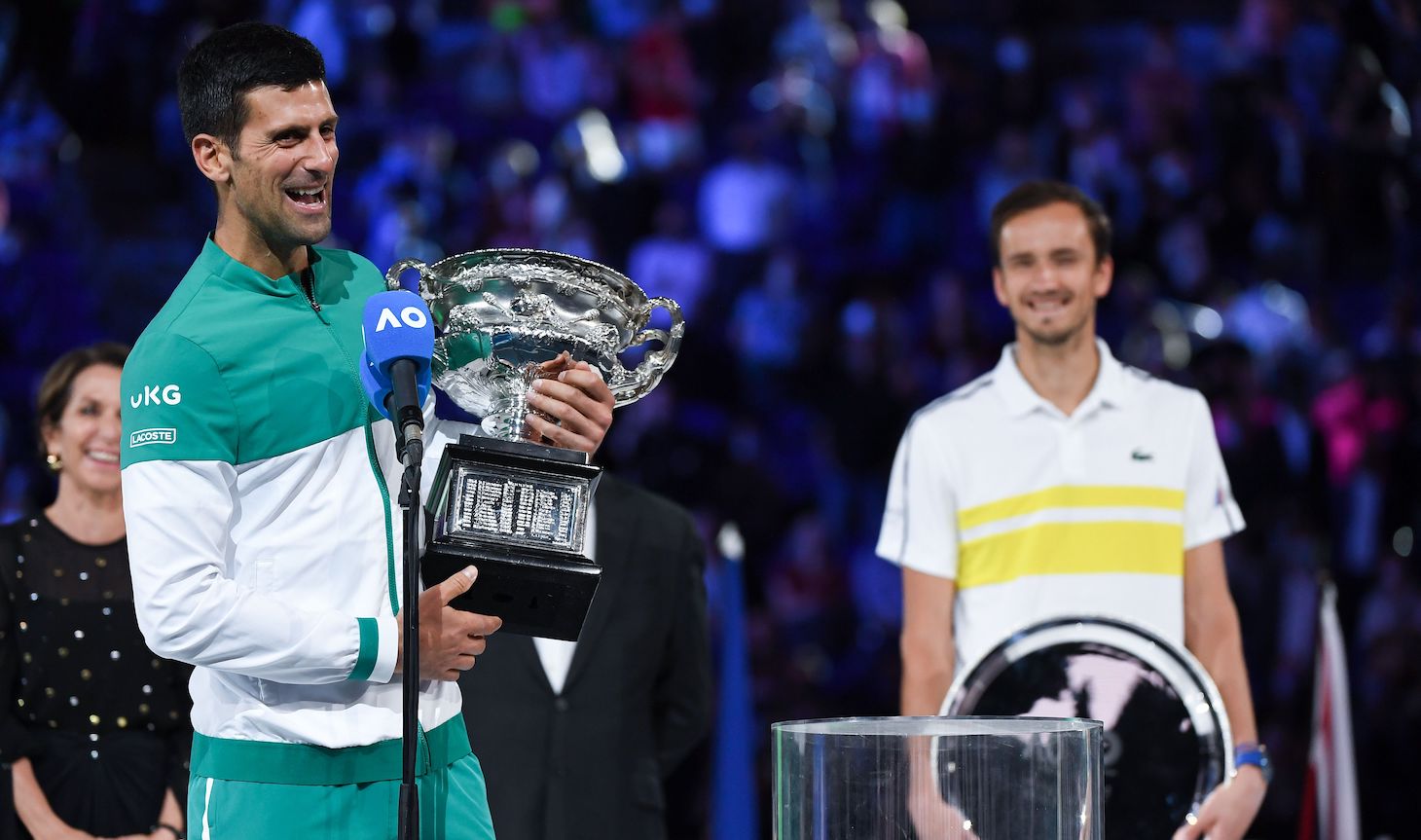I'd like to speak to tennis's manager. A refund is in order. This match was pitched to a naive public as an instant classic. The hard court player du jour vs. the best hard court player ever; one man on a 20-match win streak and the other undefeated in eight Australian Open finals; a big floppy flexible guy and ... a smaller floppy flexible guy. The backhand-to-backhand battles promised all-universe quality. The 25-year-old looked like the most viable threat to Big Three hegemony. And yet: Here I sat, owned by the sensation of sitting awake in the middle of the night to witness yet another Novak Djokovic straight-set demolition and hear the crowd boo the concept of vaccination. (These are unrelated facts, but it's OK to note the uh, thematic resonance.) Daniil Medvedev was supposed to be better than a 7-5, 6-2, 6-2 send-off that didn't even cross the two-hour mark.
And he is better than that bleak scoreboard indicates. He spent the last few months winning three titles and beating every other top-ten player. After their semifinal a defeated Stefanos Tsitsipas said Medvedev "has pretty much unlocked everything in the game," and it's hard to disagree when you see how successfully he has welded defensive grinding to a 6-foot-6 guy's serving and a savant's problem-solving. But where was that last bit? For all the knowing chatter about how this was a "Queen's Gambit" game, Sun Tzu on hard court, a battle of wits, etc., I will confess that this tennis match looked to my civilian eyes like a formless blob with no interplay of ideas. Djokovic had his designs: He pounced on second serves and won a scary 54 percent of those return points; he put the onus on a passive Medvedev to end rallies; he reeled off a number of early drop shots to make his tall foe bend low and move into uncomfortable court positions. But Medvedev did not seem to bring any specific vision into the match. Nothing in his play changed until he was nearly toast, and then came a handful of abortive net rushes and premature trigger-pulls from the baseline. Testing out interesting "tactics" is probably the privilege of people who aren't playing Novak Djokovic in Rod Laver Arena. If you are not Rafael Nadal you might not have a single good idea that survives a single baseline exchange with him.
There were other glitches. One issue is that Medvedev marshaled none the mental gruel of his five-set near-comeback against Nadal at the 2019 U.S. Open final; he was throwing up his palms and jawing at his player's box well before he was out of contention. One possibly intertwined issue is his movement didn't seem to be backed up by his usual stamina; his legs did not look up for the five-set death march many anticipated here. And the primary issue was that Novak Djokovic is, somehow, even better than his 17—now 18—major titles would have suggested. In an absolute sense he is just too good. Contra Tsitsipas, there are a lot more unlockables in this game, and the Big Three aren't sharing the location of those sidequests.
By objective figures, this was Djokovic's hardest path to a trophy, with five sets lost and 16 hours and 45 minutes spent on court—both worsts among his 28 trips to a major final. There was also the long-running mystery of the abdominal injury he had treated during his third-round match against Taylor Fritz last week. A visibly pained Djokovic spent the next stretch of the match rotating his trunk as little as possible—this proves difficult in a sport where you constantly swing a racket at an incoming object—gritted through a five-set win over Fritz, speculated that it was a "muscle tear" after the match, and said he was unsure he would be fit for his next match two days later. He didn't play tennis until two hours before that fourth round against Milos Raonic, then won in four sets with tape all over his torso. He then said it was "kind of a gamble" to keep playing, that the painkillers obscured the underlying situation, and that an MRI clarified the nature of the injury but he didn't want to divulge that during the tournament. Djokovic was back to his old imperious self by the end of the second week. After taking the title he confirmed that it was a torn oblique. (Having had a minor version of this injury that made every passing cough feel like a freshly sharpened Ticonderoga to the guts, I will simply say what the hell man.)
Amid the pain, Djokovic strung together one of the best serving performances of his career. This was the upside of playing on what he called "ice," the fastest Australian Open surfaces he said he'd played on in 15 years. Serving became a matter of hitting his spots and letting low skids off the slick court would take care of the rest. He served 103 aces in this tournament, and hit a career-best 26 in his quarterfinal against Alexander Zverev. If any of this is replicable on other surfaces, it augurs well for his longevity, following the logic that shorter points put less stress on a player's legs and lungs. Candidly the prospect of Novak Djokovic suddenly gaining a bail-out serve is sort of demented. It's just too good. While he did hand Medvedev a number of gifts, it was this level of serving that let him dig himself out of the dicey 15-30 and 30-30 spots in this match. In one of the final games of the third set he mixed in a devilish serve-and-volley point, just to show he could.
Medvedev, current master of the runner-up speech, was in his usual cheery truth-telling mode afterwards. "I really wanted to make this match longer and more entertaining for you," he told the crowd, "but today was not the day." He sweetened the final's bitter aftertaste with an anecdote about how Djokovic chummed it up with him even when Medvedev was a peon ranked No. 500 or 600. In the press conference later, he just said out loud what everyone already knows about Roger Federer, Rafael Nadal, and the guy who just whooped him: “When they're in the zone, and I'm not shy to say it, I feel like they're just better tennis players, which shows [in] facts and numbers, than the rest of us." There is no use being evasive about this reality. Last September Dominic Thiem become the only man born after 1988 to win a major title. Thiem's path to that U.S. Open title, of course, only cleared when Djokovic unintentionally spiked a lineswoman in the throat and got disqualified. Similarly exotic flukes may be necessary to open up future vacancies at the grown-ups' table. Injuries to muscle tissue central to the execution of tennis clearly aren't dramatic enough. "We're talking about some cyborgs of tennis," said Medvedev, "in a good way."






